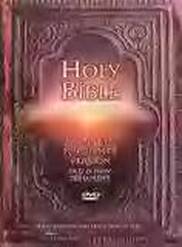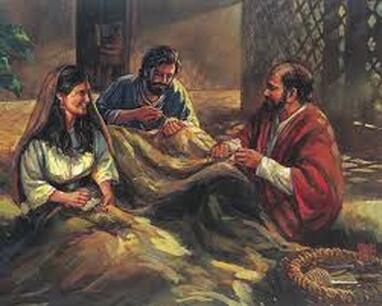Acts 18:1-11
Lesson 262
Read both the "King James Bible" and the "New Living Translation."
In this lesson:
Paul goes to Corinth.
Teaching Jews and Gentiles.
Priscilla and Aquila.
Tentmakers Priscilla, Aquila, and Paul.
(Artist unknown)
(Artist unknown)
Where was -
Corinth -
Corinth was the capital and most important city in the Roman province of Achaia, perhaps in all Greece. It was located forty-seven miles west of Athens on the Isthmus of Corinth in southern Greece. Corinth was destroyed in 146 BC by the Roman army and rebuilt by emperor Julius Caesar 100 hundred years later in 46 BC. Thanks to its two excellent ports; the city became a vital trade center and a major hub between Rome and Asia. Corinth shipped trade goods throughout the known world. Similarly, the Gospel was also able to move quickly from Corinth to all parts of the Roman empire. Without bustling trade centers like Corinth, Christianity would have taken longer to spread. When Paul visited Corinth, the population was over 650,000 (including 400,000 slaves). Corinth was a Gentile city and embraced Greek culture. It was wealthy, corrupt, and so licentious that its very name became a synonym for sexual immorality. The temple of Aphrodite (Venus), the pagan goddess of love and fertility, raised money by furnishing a thousand male and female slaves as prostitutes. The city also boasted numerous schools of philosophy and rhetoric. In Corinth, Paul wrote, "The Epistle of Paul the Apostle to the Romans" and the first and second Epistles of Paul the Apostle to the Thessalonians. Five years after leaving Corinth, Paul wrote the First and Second Epistles of Paul the Apostle to the Corinthians (people of Corinth). A massive earthquake destroyed Corinth in 1858. A new city with the same name was built four miles away. The ruins of old Corinth have been well excavated. Ancient Corinth maintained a sophisticated underground waterway that brought fresh water to its citizens. Shops, pagan temples, a theater, music hall, city streets, fountains, paving stones, large stone columns dating back to the fifth century BC, together with inscriptions have been uncovered. One inscription found in the old marketplace reads "makkelon," Greek for "shambles." Shambles is the very word Paul used to describe the market district in Corinth (1 Corinthians 10:25).
Rome -
The capital of the vast Roman empire that stretched from Britain to the Euphrates River in Western Asia, and from the Black Sea to Africa. Founded in 753 BC, Rome ruled over most of the known world and grew rich off its military conquests. For centuries, Rome was the center of military power, politics, art, culture, and was the worlds trading hub. At the time of Paul's visit, Rome was a sprawling metropolis with a population of 1,200,000 people (half of them slaves). Rome was filled with magnificent buildings, theatres, beautiful homes, palaces, pagan temples, public baths, parks, gardens, and marketplaces. Art, music, and sporting events filled the city. Every race, ethnic group, and nationality then known could be found in Rome. If Paul wanted to spread the Gospel throughout the world, there was no better place to be than Rome.
Corinth -
Corinth was the capital and most important city in the Roman province of Achaia, perhaps in all Greece. It was located forty-seven miles west of Athens on the Isthmus of Corinth in southern Greece. Corinth was destroyed in 146 BC by the Roman army and rebuilt by emperor Julius Caesar 100 hundred years later in 46 BC. Thanks to its two excellent ports; the city became a vital trade center and a major hub between Rome and Asia. Corinth shipped trade goods throughout the known world. Similarly, the Gospel was also able to move quickly from Corinth to all parts of the Roman empire. Without bustling trade centers like Corinth, Christianity would have taken longer to spread. When Paul visited Corinth, the population was over 650,000 (including 400,000 slaves). Corinth was a Gentile city and embraced Greek culture. It was wealthy, corrupt, and so licentious that its very name became a synonym for sexual immorality. The temple of Aphrodite (Venus), the pagan goddess of love and fertility, raised money by furnishing a thousand male and female slaves as prostitutes. The city also boasted numerous schools of philosophy and rhetoric. In Corinth, Paul wrote, "The Epistle of Paul the Apostle to the Romans" and the first and second Epistles of Paul the Apostle to the Thessalonians. Five years after leaving Corinth, Paul wrote the First and Second Epistles of Paul the Apostle to the Corinthians (people of Corinth). A massive earthquake destroyed Corinth in 1858. A new city with the same name was built four miles away. The ruins of old Corinth have been well excavated. Ancient Corinth maintained a sophisticated underground waterway that brought fresh water to its citizens. Shops, pagan temples, a theater, music hall, city streets, fountains, paving stones, large stone columns dating back to the fifth century BC, together with inscriptions have been uncovered. One inscription found in the old marketplace reads "makkelon," Greek for "shambles." Shambles is the very word Paul used to describe the market district in Corinth (1 Corinthians 10:25).
Rome -
The capital of the vast Roman empire that stretched from Britain to the Euphrates River in Western Asia, and from the Black Sea to Africa. Founded in 753 BC, Rome ruled over most of the known world and grew rich off its military conquests. For centuries, Rome was the center of military power, politics, art, culture, and was the worlds trading hub. At the time of Paul's visit, Rome was a sprawling metropolis with a population of 1,200,000 people (half of them slaves). Rome was filled with magnificent buildings, theatres, beautiful homes, palaces, pagan temples, public baths, parks, gardens, and marketplaces. Art, music, and sporting events filled the city. Every race, ethnic group, and nationality then known could be found in Rome. If Paul wanted to spread the Gospel throughout the world, there was no better place to be than Rome.
Study Tip:
"Read the Bible with an open mind. Don't read into its passages ideas that are not there.
Try to search out fairly and honestly the main teachings and lessons of each passage."
Henry Hampton Halley, minister and religious writer (1874-1965).
"Read the Bible with an open mind. Don't read into its passages ideas that are not there.
Try to search out fairly and honestly the main teachings and lessons of each passage."
Henry Hampton Halley, minister and religious writer (1874-1965).




